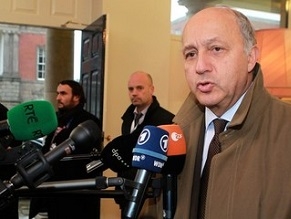|
World Jewish News

French Foreign Minister Laurent Fabius.
|
London and Paris fail to get support of their EU partners for lifting arms embargo to the Syrian rebels
25.03.2013, Israel and the World France and Britain failed to get the European Union support for their call to lift the arms embargo on Syrian rebels despite raising concerns about the use of chemical weapons by Syrian President Bashar al-Assad.
"I insisted that very close attention must be paid to the possible use by Assad of chemical weapons.There are indications that he might have used them or that he might use them," French Foreign Minister Laurent Fabius told reporters after an meeting of EU Foreign Ministers in Dublin over the weekend.
After a two-year civil war that has killed 70,000 people, Paris and London say they want to raise pressure on the al-Assad regime and try to force him to the negotiating table by allowing the supply of arms to the Syrian rebels.
Assad's supporters and opponents accused each other of using chemical weapons after 26 people were killed in a rocket attack near the northern city of Aleppo this week.
In a letter to EU foreign policy chief Catherine Ashton setting out their case, Fabius and his British counterpart William Hague said they were "increasingly concerned about the regime's willingness to use chemical weapons".
But several EU countries, including Germany and Austria, remain opposed to lifting the arms embargo for the rebels. They fear it could lead to weapons falling into the hands of Islamists, fuel regional conflict and encourage Assad's backers, Iran and Russia, to step up arms supplies to him.
"We are reluctant about lifting the embargo. We have to avoid that weapons could come into the wrong hands and that terrorists, jihadists, extremists would misuse these weapons," Germany's Foreign Minister Guido Westerwelle told journalists at Dublin Castle.
Irish Foreign Affairs Minister Eamon Gilmore, whose country currently holds the EU presidency, said he is opposed to the proposal by Britain and France to lift the arms embargo, stressing that “further militarisation in the conflict was not the way to go.”
Austrian Foreign Minister Michael Spindelegger said he could not see any reason for a compromise. "We are totally against so I can't see where there could be a compromise," he said.
If the arms embargo were to be lifted, Spindelegger said it would make it very difficult for Austria to leave several hundred troops on the Israeli-occupied Golan Heights as part of a U.N. peacekeeping force, because the EU would be perceived as taking sides in the Syria conflict.
"We don't need more weapons in Syria," he said. "We need a political solution."
The EU has until June 1 to decide whether to renew or amend its sanctions on Syria and it was decided that discussions on the embargo issue will continue in the framework EU working groups.
Any change on the sanctions needs unanimity of the 27 EU member states. Without agreement, all EU measures against Syria, including asset freezes and travel bans, would end on June 1.
British Foreign Minister Hague seemed to hold out some hope of compromise however by saying that the embargo could either be lifted entirely or "seriously" amended.
Three weeks ago, London and Paris pressed their EU partners to ease the Syria arms embargo to allow the supply of "non-lethal" equipment as well as "technical assistance" -- which includes training -- to the rebels.
Britain immediately pledged armoured vehicles and protective clothing.
Diplomatic sources said the existing arms embargo possibly could be amended again to allow the supply this time of "lethal" but "defensive" equipment.
Some opponents of lifting the arms embargo are ready to look at easing economic sanctions on rebel-held areas of Syria to try to strengthen the opposition.
One option would be to ease a ban on EU oil imports from Syria to permit opposition groups to sell oil to Europe, EU diplomats said.
In a statement issued after the Dublin Foreign Ministers meeting, EU foreign policy chief Catherine Ashton said “we are looking at how to increase assistance to the moderate Syrian opposition, in particular through political and economic support and we continue to put as much pressure as we can on the regime and to increase that pressure to participate in a meaningful political process.”
“Everyone is aware that we have to review our sanctions package by 1 June. So, in the coming weeks this will be an opportunity to examine all options to achieve the EU’s goals. Following our discussions here in Dublin, I have asked for discussions to continue in all the relevant groups of the Council in Brussels over these coming weeks.”
The West remains dubious over the fragmented Syrian opposition, with the US military's top officer General Martin Dempsey this week saying Washington had only an "opaque" view of the rebels.
US Secretary of State John Kerry has said the United States would not oppose moves by some European countries to arm Syrian rebels but Washington has fears the weapons could end up in the hands of Al-Qaeda-linked rebels.
by: Yossi Lempkowicz
EJP
|
|
